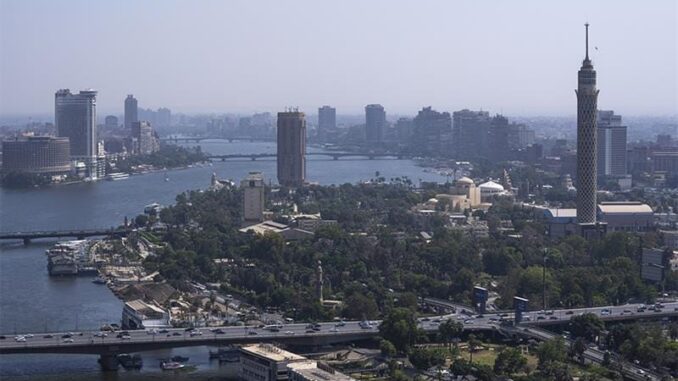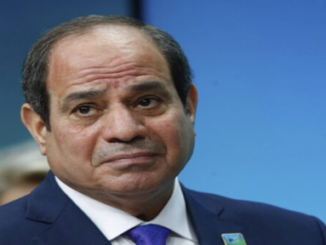
Egypt’s external debt reached 165.3 billion U.S. dollars by the end of March, registering a 4.8-percent increase compared to the same period in the previous year, according to CBE
At the beginning of 2023, the foreign debt stood at 162.93 billion dollars, the data released by the Central Bank of Egypt (CBE) yesterday showed.
Egypt has faced economic hardships in recent years due to various crises, including the COVID-19 pandemic and the Russian-Ukrainian conflict.
The CBE devalued the Egyptian pound twice in 2022, leading to a significant loss in its value.
To address economic challenges, Egypt sought financial support from the International Monetary Fund, which approved a 46-month, 3-billion-dollar loan in December 2022 to finance the country’s economic and structural reforms.
The Egyptian government is now focusing on attracting foreign investments and boosting the tourism sector as the key source of hard currency to help with the country’s economic challenges.
Recent reports indicate that in H1 of FY2022/23 (July-December 2022), Egypt’s budget deficit surged to over EGP 367 billion (almost $12 billion), equating to roughly four percent of the GDP.
Egypt has committed to achieving a budget deficit of 6.1 percent of the GDP and a gross debt ceiling of 92.1 percent of the GDP by the end of the unreleased FY 2022/23.
A financial deadlock
However, with the country’s future at stake, Sisi says he hopes lenders are ‘understanding’ about the impacts of the economic crisis.
At a finance summit in Paris last month, Egyptian President Abdel Fattah el-Sisi called on lenders to show more “understanding” of his country’s deteriorating debt crisis.
The previous week, Sisi appeared to have ruled out a future devaluation of the pound, which has lost half of its value since February 2022.
Sisi justified this because of “national security” concerns, a thinly veiled reference to possible mass disturbances if the pound loses even more of its value and inflation continues to soar.
The move contravenes a key condition of the $3bn International Monetary Fund (IMF) support package approved for Egypt late last year, which stipulated adherence to a flexible exchange rate.
On the heels of the Paris summit, the Egyptian central bank decided to keep interest rates steady, despite rising inflation that reached 32.7 percent in May.
This series of statements and policy decisions seems to reflect an awareness by Cairo that continued devaluation and monetary tightening will not remedy Egypt’s burgeoning debt crisis, while at the same time, it is showing remarkable resistance to necessary reforms that could alleviate the crisis.
The regime’s solution seems to revolve around waiting for a miraculous inflow of dollars to allow it to manage another currency devaluation, which does not seem to be forthcoming. In simpler terms, Sisi has hit a dead end and is waiting for unexpected deliverance.
The decisions made by the regime are rational, however, barring a radical transformation of the model of militarised state capitalism at the heart of the crisis.
The decision to keep interest rates steady reflects the understanding that inflation is not caused by increased demand; orthodox economic theory assumes it can be remedied by raising interest rates.
This awareness was reflected in an IMF panel discussion attended by Central Bank Governor Hassan Abdalla, who identified supply issues as the root cause of the inflationary wave hitting the country.
At the same time, Sisi’s decision to rule out another currency devaluation for fear of instability tied to rising prices reflects an awareness that a rapidly weakening currency, rather than increased demand, is the cause of inflation.
What remains unsaid is that increasing interest rates are imposing a heavy burden on the state budget, worsening the debt crisis, and failing to attract hard currency capital inflows, which are critical to alleviating the crisis.
In the upcoming fiscal year, loan and interest repayments are set to consume 56 percent of the budget – an astounding figure, more than public spending and social support combined, which stand at 13.5 percent and 12.2 percent respectively. Increased interest will hardly help to alleviate the debt burden on the state budget.
Higher interest rates have also failed to attract badly needed capital inflows in Egyptian debt instruments, as was made clear in a bond offering in April, which saw only 0.04 percent of the three-billion-Egyptian-pound ($97m) offering sold, with investors deterred by an expected pound devaluation.
In spite of a number of devaluations over the past year, the pound has remained under pressure, with the devaluations failing to generate the required hard currency capital inflows.
On the black market, the Egyptian pound still trades at around 38 pounds to the dollar, substantially higher than the official 30.9 exchange rate.
This is coupled with a severe hard currency shortage that is crippling the Egyptian economy. A number of steel mills have either ceased production or reduced it due to their inability to import necessary raw materials. More alarmingly, there are reports of delays in payment for wheat shipments, although the government has denied this.
There are also reports of a return of Egypt’s import backlog, with items stuck in Egyptian ports, despite government assurances that the backlog was cleared at the start of the year.
The regime seems to have realised that another devaluation is not a guaranteed solution to the crisis, and that it will take fundamental reforms to lure investors, which the regime is unwilling and unable to do. In simpler terms, Egypt has reached a deadlock.



